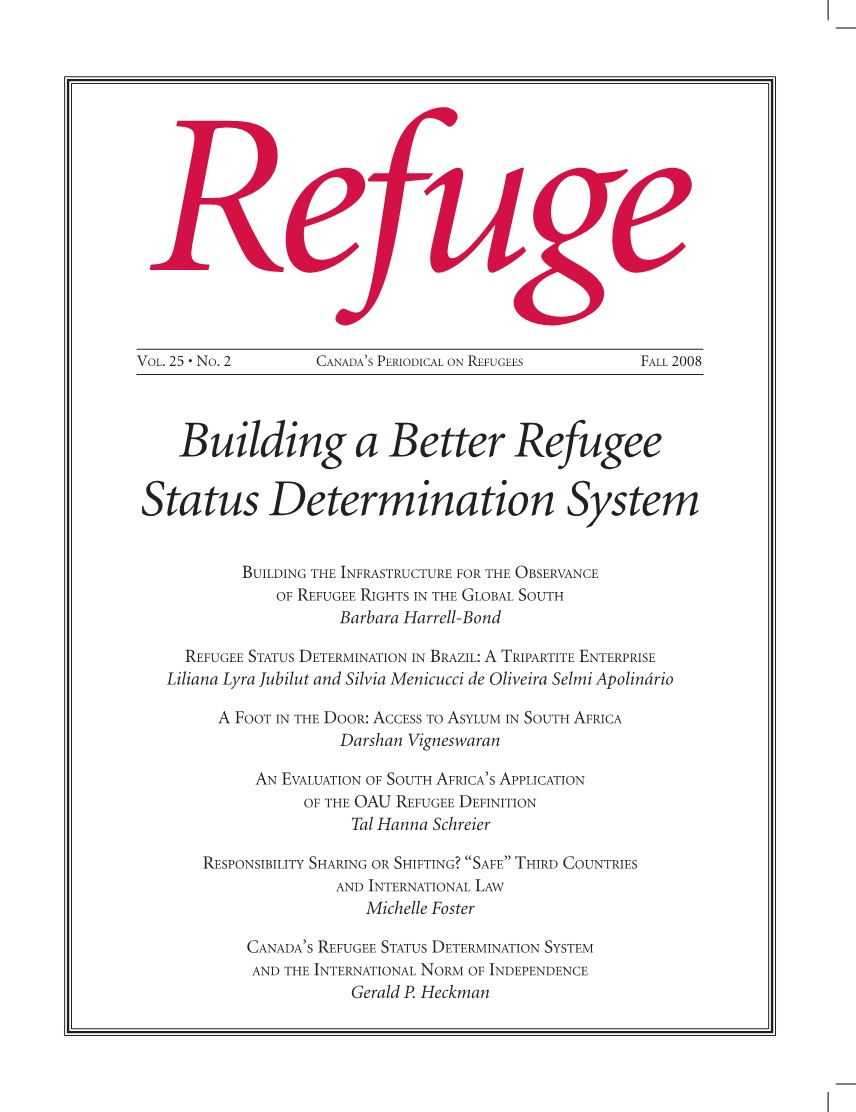Building the Infrastructure for the Observance of Refugee Rights in the Global South
DOI:
https://doi.org/10.25071/1920-7336.26028Keywords:
Global South, NGOs, Southern Refugee Legal Aid Network, SRLAN, Fahamu, human rights, refugee rights, refugee law, legal aid, interagency cooperationAbstract
Refugees in the Global South face many serious violations of their rights. Several major host states have failed to ratify both the Refugee Convention and the 1967 Protocol. However, even among those states that have ratified one or both, few have enacted the domestic legislation to implement the provisions, and no state in the South has made a serious effort to bring domestic law in other subjects—immigration, health, labour, education—into harmony with the rights of refugees and their international commitments. This article presents a multi-faceted proposal, a guide to building a new global infrastructure for the protection of refugees. An important precursor is the rapid expansion in the teaching and studying of refugee law. Today’s students of refugee issues are tomorrow’s researchers, lawyers, and scholars, all of which are desperately needed to help refugees navigate the process of status determination and resettlement, to advocate more generally for the rights of refugees, and to monitor states’ compliance with international obligations. Also, human rights NGOs need to embrace the fact that refugees are human beings, and refugee rights are human rights. Furthermore, advocacy groups, legal aid organizations, and other NGOs need to understand that advocacy, legal assistance, and research must go hand in hand: the provision of legal assistance to individual refugees not only makes the use of their life stories for research and advocacy more ethical, it improves the quality of the research and advocacy as well. Perhaps most importantly, all the groups working with refugees throughout the South must communicate with and assist each other. In an effort to facilitate this crucial networking and communication, sixteen refugee advocacy and legal aid NGOs from the South attended a five-day workshop in Nairobi in January 2007. The group decided to form the Southern Refugee Legal Aid Network, and to produce a charter for membership. I have been acting as the group’s moderator informally since that time. In the coming months, SRLAN will attach itself to Fahamu, an advocacy NGO that publishes Africa’s largest circulation magazine and has a proven track record of facilitating emerging advocacy networks. Fahamu will do fearless advocacy, often too dangerous for individual NGOs, and the SRLAN will facilitate the communication and co-operation necessary to begin the construction of the new global infrastructure for the protection of refugees. Working together, as a network of organizations throughout the South, we truly can transform this broken and unjust system.
Metrics
Downloads
Published
How to Cite
Issue
Section
License
Copyright (c) 2008 Barbara Harrell-Bond

This work is licensed under a Creative Commons Attribution-NonCommercial 4.0 International License.
Refuge authors retain the copyright over their work, and license it to the general public under the Creative Commons Attribution-Non Commercial License International (CC BY-NC 4.0). This license allows for non-commercial use, reproduction and adaption of the material in any medium or format, with proper attribution. For general information on Creative Commons licences, visit the Creative Commons site. For the CC BY-NC 4.0 license, review the human readable summary.







